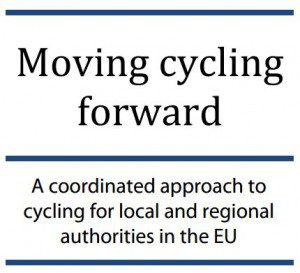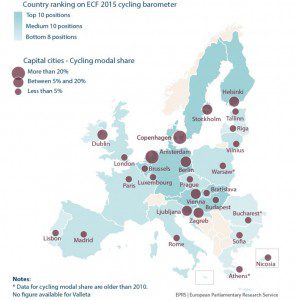European Parliament think tank recommends creation of EU level cycling strategy
A European Parliament think tank has published a 27-page document recommending that the European Commission consider a coordinated approach to developing
the European Commission consider a coordinated approach to developing
cycling for transport across the EU.
The Moving Cycling Forward report, written by the Marketa Pope of the European Parliamentary Research Service, concludes that the Commission could strengthen effective delivery of cycling provision by “means of a strategic document which covers all the areas that impact on cycling in one text.”
At present, no cycling strategy exists at EU level.
The recommendation looks at cycling’s pros and cons from a number of angles in justifying its position; detailing fiscal incentives, road safety data, health and tourism benefits, congestion, emissions and plenty more.
Some particularly notable points include:
- job creation, something for which cycling produces more than even the motoring industry.
- Public health: The World Health Oragnisation’s recommendation to build for active travel has been cited here. A reduction in illnesses related to a sedentary lifestyle is a key factor in saving economies money, according to numerous sources. A cross department strategy that factors this in is encouraged. Cities can now self asses the economic benefit of cycling’s health benefits by using the World Health Organisation’s Health Economic Assessment Tool.
- Congestion is costing Europe around 1% of its GDP per year at €100 billlion. Reducing car use has a knock on effect on lost working hours, wasted fuel and plenty more
- Noise reduction: Road traffic is responsible for the majority of noise pollution in Europe, which reduces quality of life in urban areas.
- Cycling as part of an education: This suggestion points to evidence that children who cycle can become less car dependent in later life, thus reducing congestion and upping levels of fitness in adults.

The paper goes on to state: “In combination with appropriate funding, this (strategy document) could send a strong signal to all levels of administration that cycling is taken seriously as a means of transport which reduces urban congestion and pollution, while making people healthier.”
Mounting interest across member states, including the EU Ministers for Transport committing to promoting cycling as a climate-friendly transport mode, has prompted the Think Tank’s fresh research.
The documents’ precursor offers: “Changes towards cycling mobility are becoming visible. It takes time, however, to change not only transport infrastructure and management, but also people’s attitudes, behaviour and perceptions of environment and public space. Such society-wide transformation requires a coordinated long-term effort from all levels of administration. With adequate support through relevant policies, the already positive impact of cycling could be much greater.”
In a section on challenges, safety again crops up as the number one concern when it comes to cycling for transport. Last year 26,000 people were killed on Europe’s roads, up over 300 on the year prior. Cyclists made up 8% of that grim tally.
On improving life for everyone on the roads, the document states: “Active commuters are also likely to benefit from a ‘safety in numbers’ effect: the more people cycle, the safer cycling becomes, as car drivers gradually get used to the presence of cyclists and are more likely to be cyclists themselves.
Infrastructure too is key and the report praises Dutch regions, Flanders and even London in constructing safe and efficient routes. City planners increasingly have a wealth of data to work with and where change has taken place, Strava Metro recently described behaviour change as “overnight”.
Funding is often a barrier to radical infrastructure change, however €2 billion in EU cash is available to cycling projects across all member states.
In September of last year, the European Parliament called for an EU roadmap for cycling to form part of the European Commission’s 2016 Work Programme. This called for cycling to be integrated into multimodal transport policy, as well as create a strategic document for use by local and regional authorities when it comes to integrating cycling into their communities.
“A strategic document affirming cycling’s undisputed position in the transport mix, would not only send out a positive message to local authorities that they are on the right track irrespective of the position of their national authorities, but could also help embed cycling in national health and transport policies,” says the EPRS document.
Active travel ambitions have been added to a separate European Parliament document on national emission limits, though recommendations here have as yet not been adopted and may even be set for a watering down.
To read the Moving Cycling Forward report in full, click here.



